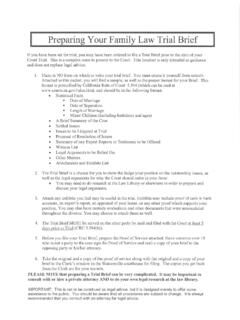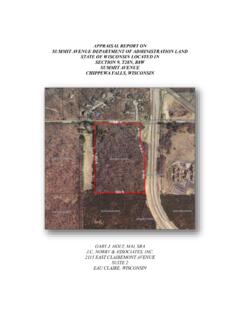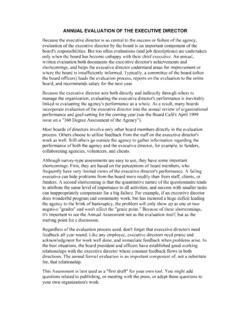Transcription of Critical Reviews and Literature Reviews
1 Critical Reviews and Literature Reviews The main ideas or arguments in the book or article. Don t feel you have to mention everything: part of being an effective evaluator is being able to extract the most important ideas from a source. Your own evaluation of the book or article. Don t just accept the author s statements without question. Ask yourself such questions as: How effective is the author s argument? Is it clearly presented and explained? Is it biased in any way? A Critical review is not just a summary. 1. First, read the assignment carefully. Your instructor may ask, for instance, that you read the book/article in the context of concepts you have covered in class, or that you focus on specific aspects of the book in your Critical review. You can use this information to help guide your reading.
2 2. Before you begin reading, look at the title, as well as the chapter titles or article subheadings, to get an idea of what the author will focus on. You might start forming ideas about what you expect the book/article will say, and then, as you read, decide whether the book/article fulfills your expectations, or whether it leaves important questions unanswered. 3. Read actively. You might want to skim the book/article first, and then go back and take notes (remember to copy down page numbers!). You ll have two main purposes in your reading. Your first purpose is to understand the author s argument (what the author is trying to show, and the steps he or she takes to prove this argument). Your second purpose is to evaluate the effectiveness of the author s argument. Make note of anything that s confusing or unclear. Write down any questions you have (pay particular attention to questions that seem important, but that the author doesn t address).
3 What does a Critical review include? Reading a book or article for a Critical review: UMKC Writing Studio Writing a Critical Review: There s no specific format for Critical Reviews (for instance, you might choose to summarize and then evaluate, or you might choose to combine these two aspects), but your essay should include the following components: 1. Introduction: Your first paragraph should familiarize your reader with the book/article you will discuss, as well as with your own evaluation of the book. Mention the book s title and author, and provide a brief overview of the author s argument. Then give your own argument about the book/article s effectiveness (this is your thesis). Be specific give the main reasons for your evaluation of the book/article. (If your assignment also asks you to place the book within the context of larger issues, your introduction should also mention important connections between the book and these other issues.)
4 2. Summary: Use this section to familiarize your reader with the author s argument. Explain the author s stance on the topic, and the main points he or she makes in order to back up the argument. Describe the author s conclusions about the topic. 3. Evaluation (Critique) of the Article or Book: This is the most important section of your essay. Remember, you re not writing about whether you agree with the author or not; rather, it s your job to decide how effective the author s argument is. Here are some criteria you can use to decide: i. Is the writing clear? Does the author s writing style make his or her argument clear, or does it create unnecessary confusion? ii. How strong is the author s argument? Do the author s main points back up the argument effectively? Is the argument logically organized? iii. Are there indications of bias?
5 Does the author mention all sides of an issue, or does he or she leave out important counter-arguments? What do you know about the author? Is there anything in the author s background that might have caused bias? iv. What are the author s sources? Are they reliable? Does he or she use predominantly one type of source? Are the author s sources appropriate to his or her argument? v. Which aspects of the author s argument do you find most convincing? Least convincing? *Remember to be specific. For instance, if you feel the author s writing is unclear, explain why. You might give an example to demonstrate your point to the reader. If you feel the author s argument is not convincing, provide reasons for your evaluation. 4. Conclusion: In your conclusion, you will restate the main points of your evaluation (you don t need to restate your summary of the book or article).
6 The conclusion is also an opportunity to give your overall evaluation of the book or article. You could also offer final comments on such aspects as the book s contribution to the field, or possibilities for further research. Writing a Literature Review: A Literature review is a type of Critical review in which you analyze and evaluate many sources on a specific topic. The purpose is to provide your reader with an overview of the research that has been done on your topic, and to evaluate the sources you are reviewing. You will probably include less detailed information on each source than you would in a Critical review of a single book or article. Instead, you will focus on the most important points relevant to your topic. As in a Critical review, you ll evaluate the effectiveness of the authors arguments. You ll also point out areas where much research has been done, as well as areas where more research still needs to be done.
7 It s also important to compare sources with each other, pointing out where they agree or disagree with one another. Remember, you also need to provide an evaluation explaining which authors writing you find more persuasive, and why. Finally, you will draw conclusions from your findings, describing what the Literature as a whole suggests about your topic. Remember to take into consideration your evaluations of the relative effectiveness of the different authors arguments. If there are important aspects of the topic that have not yet been fully researched, you might not be able to reach definite conclusions. If this is the case, you can discuss why more research is needed. Sources consulted (the Writing Center has these books): Lunsford, A., & Connors, R. (Eds.). (1995). The St. Martin s handbook. (3rd Ed.). (Annotated Instructor s Edition).
8 New York: St. Martin s Press. Pan, (2003). Preparing Literature Reviews . Los Angeles: Pyrczak Publishing. Rosen, , & Behrens, L. (Eds.). (1992). The Allyn & Bacon handbook. (Instructor s Annotated Edition). Boston: Allyn & Bacon. University of Wisconsin-Madison Writing Center. ( ). Critical Reviews . Retrieved July 13, 2004 from Virginia Tech Department of History. ( ). Writing an article review. Retrieved July 13, 2004 from See pp. 709-11 for a sample Literature review See pp. 170-90 for three sample Literature Reviews This site includes a sample first page of an article review








